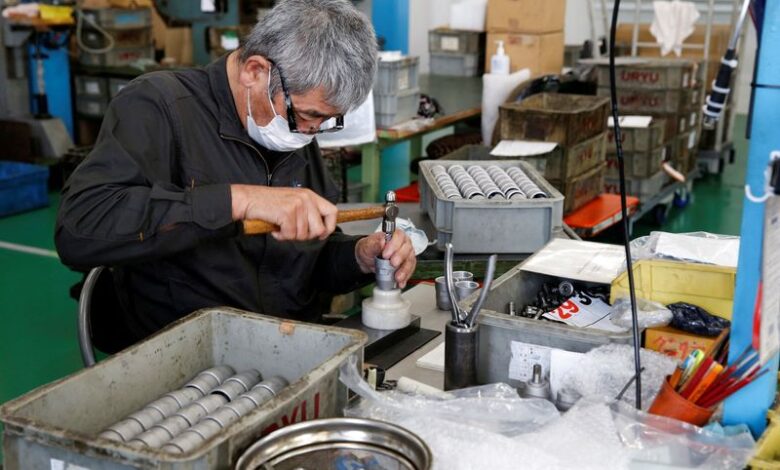As inflation and a lack of workers hurt, Japan Inc. tries to attract skilled workers.

TOKYO, April 16 (Reuters) -From inflation allowances to helping workers learn new skills, companies in Japan are doing more to help workers deal with rising prices and a shortage of workers, even though some can’t afford pay raises that do more than cover cost-push inflation.
As the annual “shunto” labour talks get into full swing, pressure is growing from both workers and managers for companies to offer these kinds of raises to offset, if not beat, consumer inflation, which hit a 41-year high of 4% in December.
During the spring round of labour talks, which will end in the middle of March, big companies like Toyota Motor (NYSE:TM) Corp. negotiate with their own unions to set wages for the next fiscal year, which starts in April.
Labor shortages and rising consumer inflation, which is double the central bank’s target of 2%, are pushing cautious companies with $3.8 trillion in internal reserves to raise wages.
Teikoku Databank, a company that does research on corporate credit, said that about a quarter of Japanese companies have offered or plan to offer inflation allowances. On average, these allowances range from 6500 yen ($50) a month to 54,000 yen all at once.
Shinichiro Mori got a one-time payment of 150,000 yen from Cybozu Inc., a company that makes groupware, right after he and his wife had their second child. All 800 of the company’s workers were given the payment.
“I liked the money,” Mori, who is 41 years old, told Reuters. “We used it to buy things for our baby, pay our bills, and cover other living costs because we were home all day taking care of our child.”
The fact that Fast Retailing Co., which runs the Uniqlo clothing store chain, will change the way its employees are paid, giving them raises of up to 40%, is another example.
The private sector thinks that the push will help raise productivity, which is in line with Prime Minister Fumio Kishida’s “new capitalism” plan for sharing wealth, which puts wage increases at the top of the list.
The Japanese government is making these demands after 15 years of slow deflation. From the early 2000s to the early 2010s, when rounds of stimulus failed to boost economic growth and instead added to public debt, firms stopped raising base salaries.
SUSTAINABLE PAY HIKES
OECD data shows that Japanese workers’ wages have gone up by about 5% since 1990. In the same time period, U.S. wages went up 1.5 times and South Korean wages went up by twice as much.
Takahide Kiuchi, who used to be on the board of the Bank of Japan, said that wage increases should be kept up over time so that, in the long run, the sum of all the wage increases could make up for price increases.
“Bonuses or inflation allowances wouldn’t help much with cost-push inflation because people tend to save one-time payments instead of spending them,” said Kiuchi, who is now an executive economist at the Nomura Research Institute.
The government and the central bank say that inflation and wage growth must go hand in hand for private consumption, which makes up more than half of the economy, to grow. This will help the Bank of Japan reach its inflation target in a stable and sustainable way.
But one-time payments don’t make consumers feel more confident about spending more. A rise in base pay, which is a part of a salary that is hard to change, is more likely to make workers feel more confident and spend more.
The latest data shows that real wages fell 2.5% in November, making it the ninth straight month that they went down. This follows a 3.8% drop in October.
This year, Mori’s company, Cybozu, gave its employees a record-high pay raise in the upper range of 1% to 10%.
That would be more than Kishida’s government’s goal of 3% and even more than what the Japan Trade Union Confederation (Rengo) wanted, which was 5%. At the same time, Japan’s largest business lobby, Keidanren, urged companies to offer wage increases, including increases in base pay.
The company’s head of human resources, Yumika Nakane, said, “We always feel like we have to do something about the lack of engineers.” “We set pay scales because we know that pay is one of the main ways to get people to work for us.”
Even though the unemployment rate was 2.5% in December, which shows how tight the job market is, and there were 1.35 jobs for every job seeker, policymakers still complain about the lack of demand-pull inflation, which leads to wage growth.
LABOUR TALKS
A poll of 33 economists by the Japan Economic Research Center (JERC) showed that large companies are likely to offer the biggest pay raises in 26 years at this year’s shunto talks, or an average of 2.85% for the financial year starting in April.
But small firms, which employ seven out of every ten workers, are in a tough spot, and a separate poll by the Jonan Shinkin Bank and the Tokyo Shimbun newspaper showed that more than 70% of them have no plans to raise wages.
To get small businesses to move in this direction, the government wants to improve worker productivity and get more people to switch to industries with better growth prospects, as long as they can find work.
Over the next five years, Kishida’s government plans to spend 1 trillion yen on human resources. This money will be used to help companies hire mid-career workers and help people get new jobs by teaching them new skills.
Workers have high hopes for this year’s labour talks, which they hope will help fight cost-push inflation and ease the tight labour market so that the economy can grow.
There are some companies that are ready to take the lead.
For example, the “reskilling centre” at Internet media company Cyberagent has trained 200 IT engineers, upgrading their skills to meet the company’s needs and also attracting engineers from outside the company.
Also, starting salaries for new graduates will go up by 12% to 420,000 yen this spring.
Hiroto Minegishi, the company’s general manager for technical human resources, said, “The IT industry has a shortage of engineers. We can help solve the labour shortage by developing human resources, which is our strength.”
“Because of this, we can help wages grow and boost productivity in the IT industry.”
($1=129.9700 yen)





